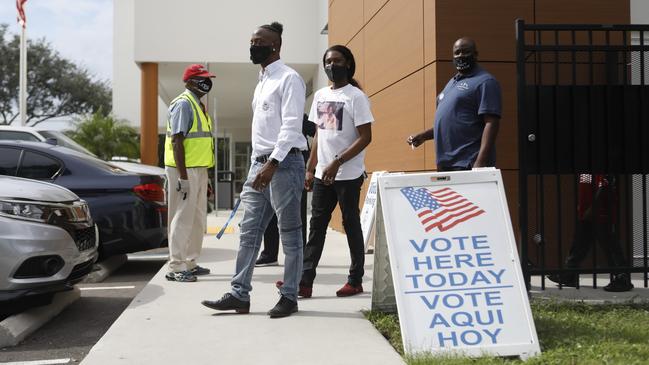US Election: did voters register pandemic handling?
The way Republican and Democrat voters responded at the ballot box to Donald Trump’s handling of the coronavirus appears just as polarised as the country itself.

It was the biggest wildcard in the US election. In key swing states that will decide the fate of Donald Trump, COVID-19 was rampaging, with daily case counts rising to the highest levels recorded since the pandemic began just as election day approached.
The way Republican and Democrat voters responded at the ballot box to Trump’s handling of the coronavirus appears just as polarised as the country itself, but in the states that will decide the election, COVID-19 might just have tipped the fragile balance towards Joe Biden.
In Arizona, a quarter of a million cases of COVID-19 have been recorded and more than 6000 people have died from the disease. The state - which has a large Hispanic population and where the median age is 38, ranks ninth out of US states on the death count tally as a proportion of its population. Four years ago, 45 per cent of voters who turned out in Arizona voted for Hillary Clinton; on Tuesday Joe Biden increased that figure by six per cent - a sizeable 250,000 votes.
It was a similar story in Georgia, which recorded more than 2700 new cases of COVID-19 on election day alone and where 8,522 people have lost their lives to the disease. Biden netted almost four per cent more votes in this US election than Hillary Clinton four years ago in Georgia, which has a median age of 37 and a large African-American population. Polls indicate that COVID-19 was the single most important election issue for more than 70 per cent of Democrat voters.
In Michigan, which has a high proportion of older people vulnerable to COVID-19, almost half a million more people voted for Biden than those that voted for Clinton in 2016.
Pennsylvania hangs in the balance for Trump, and it is one state where Biden barely managed to lift the proportion of Democrat votes compared with 2016. But it also hasn’t been as relatively hard hit by COVID-19 as other states in the US, ranking 17th in the tally of deaths per million head of population.
Experts differ on whether COVID-19 will prove to be decisive in deciding the US election. But they’re united in one assessment: in the mind of many Americans, coronavirus is as much a political issue as a health issue. Trump has made it so, undermining his top infectious disease expert Anthony Fauci, sidelining the country’s central public health agency the Centers for Disease Control and Prevention, and when he contracted COVID-19 himself, telling Americans they had nothing to fear from the disease.
“It seems pretty straightforward to me, given how close it was, that Trump’s handling of COVID-19 was the key factor in Biden’s victory,” says Thomas Jessen Adams, a senior lecturer in American Studies at the University of Sydney. “The race would have just looked entirely different had COVID-19 not occurred or had Trump vaguely handled himself in a proper manner.
“In at least the eight weeks before the election, anything that Trump wanted to do got overshadowed by COVID. For people who thought COVID was a major issue, they just overwhelmingly broke for Biden. The general feeling that Trump has massively mishandled the pandemic was the issue that kind of overshadowed everything.”
According to the VoteCast survey of more than 100,000 Americans conducted by the University of Chicago for the Associated Press, COVID-19 was the top order issue at the ballot box for 41 per cent of voters. But the importance of the issue differed along party lines, with three-quarters of those who said it was the most important issue intending to vote for Biden and only a quarter of Trump voters rating it top of their minds.
It’s likely that millions of progressives who didn’t bother turning out to vote for Clinton in 2016 were motivated by the US’s appalling trajectory on COVID-19 to cast a vote in 2020 for Biden.
While some Republicans may have applauded Trump’s derision of scientists, Democrat voters were more likely to be attuned to the scathing criticism of eminent public health experts like Jeffrey Koplan, an American physician and epidemiologist who was the director of the Centers for Disease Control and Prevention from 1998 to 2002.
Asked for his assessment of Trump and the Republican Party’s handling of the pandemic, Dr Koplan, now Vice President for Global Health at Emory University, described it as “terrible”. “There is still no national plan, no acceptance of a federal leadership role, the CDC has been sidelined, there’s mixed messages, ignoring the science, allowing unqualified players to play a visible, unscientific and destructive role, including the Commander in Chief,” Dr Koplan told The Australian.
Yet there are counterpoints to the notion that COVID-19 may have swung the US election. Florida is confounding, with one of the biggest populations of elderly people in the country, and a disastrous death toll from COVID-19. Despite this, Biden failed to flip the state.
“I think a lot of people have followed Trump’s bravado and machoism on the coronavirus - that is an advantage to Trump in some parts of America,” says Brendon O’Connor, an associate professor in American politics at the University of Sydney and the United States Study Centre. “I think it’s hard for us to get a sense in Australia of how strong that libertarian tradition of ‘live free or die’ is in the United States. “There’s a sense of ‘no-one’s going to tell me what to do’, and that experts can’t really be trusted.”
Professor O’Connor does not believe that COVID-19 played a decisive role in the US election.
“I think one of the things for us to explain is how Trump, with a lot less money and a pretty disorganised political organisation, was able to compete in what is going to be an incredibly tight result - how he was able to do that and bring lifelong Republicans and these new Republicans who are largely working class whites along for a second bite of this cherry. A lot of people thought people were going to have buyer’s remorse with Trump, that they’d seen enough - that four years of the chaos, the incompetent management, the self-aggrandisement would be too much, but it clearly wasn’t.”
Former Republican policy advisor Lanhee Chen, now a fellow in American public policy studies at the Hoover Institution and director of domestic policy studies at Stanford University, says Trump’s handling of COVID-19 seems to have been less important to voters than his “posture” on the virus. “There was tremendous frustration among many Trump supporters and independents who voted for Trump with the COVID-related restrictions placed on the US economy,” Dr Chen says. “In that way, I think President Trump’s posture on COVID-19, if not the exact steps he took, influenced the results of the election.”







To join the conversation, please log in. Don't have an account? Register
Join the conversation, you are commenting as Logout